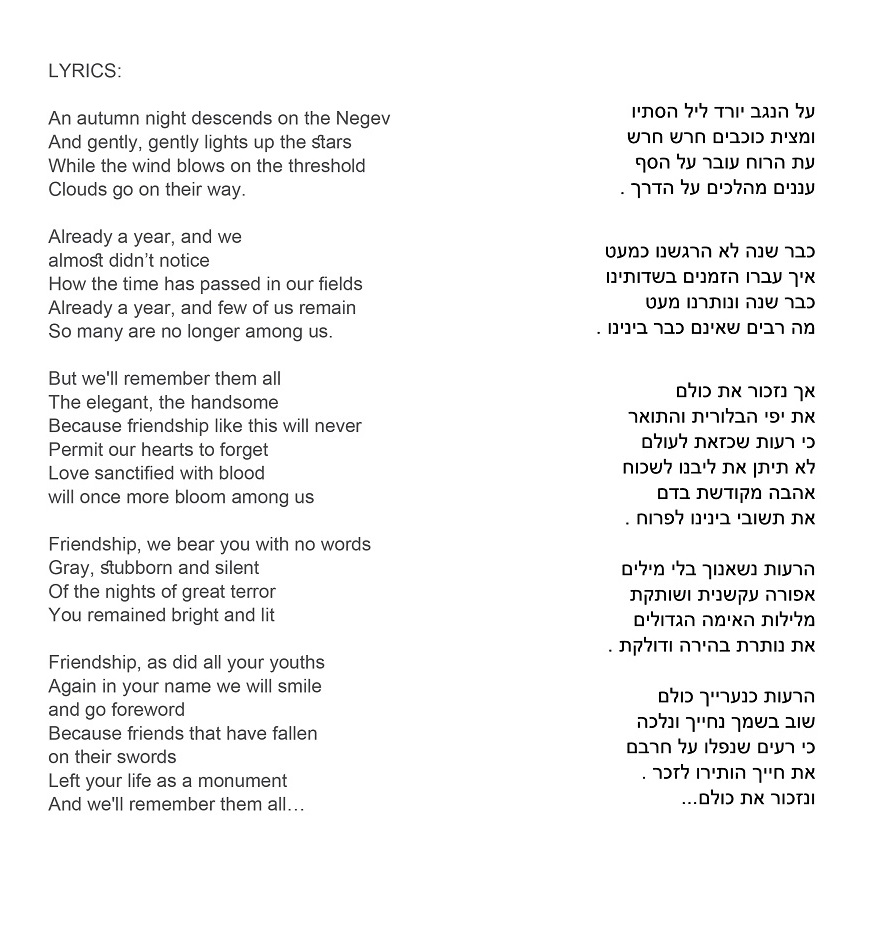Numbers (“Bamidbar”) is the fourth book of the Torah, Judaism’s foundational text. It describes events from 40 years of the Israelites’ wanderings in the desert.
(9) When you are at war in your land against an aggressor who attacks you, you shall sound short blasts on the trumpets, that you may be remembered before your God Adonai and be delivered from your enemies.
Samuel II (“Shmuel Bet”) is the second part of the third book of the Prophets. It tells the story of the reign of King David and the establishment of his capital in Jerusalem.
(19) Your glory, O Israel,
Lies slain on your heights;
How have the mighty fallen!
(20) Tell it not in Gath,
Do not proclaim it in the streets of Ashkelon,
Lest the daughters of the Philistine rejoice,
Lest the daughters of the uncircumcised exult.
(21) O hills of Gilboa—
Let there be no dew or rain on you,
Or bountiful fields,
For there the shield of warriors lay rejected,
The shield of Saul,
Polished with oil no more.
(22) From the blood of slain,
From the fat of warriors—
The bow of Jonathan
Never turned back;
The sword of Saul
Never withdrew empty.
(23) Saul and Jonathan,
Beloved and cherished,
Never parted
In life or in death!
They were swifter than eagles,
They were stronger than lions!
(24) Daughters of Israel,
Weep over Saul,
Who clothed you in crimson and finery,
Who decked your robes with jewels of gold.
(25) How have the mighty fallen
In the thick of battle—
Jonathan, slain on your heights!
(26) I grieve for you,
My brother Jonathan,
You were most dear to me.
Your love was wonderful to me
More than the love of women.
(27) How have the mighty fallen,
The weapons of war perished!
Shir Hare’ut (Song of Friendship) was written by Haim Gouri in 1949, a year after the outbreak of the Israeli War of Independence. It commemorates those who fell in the war. The words were set to music by Sasha Argov, and the song is often performed at memorial ceremonies.
The song represents the social ideals of the period of the War of Independence, including one's sacrifice for the homeland, the individual's concern for all, and the sanctity of the memory of the fallen – underscoring the idea that ours is less a story of nationalism and more a love story about family and friends

Leviticus (“Vayikra”) is the third book of the Torah, Judaism’s foundational text. It contains many laws on various topics, but the book is unified by the theme of holiness in people, time, and space.
(א) וַיִּקְח֣וּ בְנֵֽי־אַ֠הֲרֹ֠ן נָדָ֨ב וַאֲבִיה֜וּא אִ֣ישׁ מַחְתָּת֗וֹ וַיִּתְּנ֤וּ בָהֵן֙ אֵ֔שׁ וַיָּשִׂ֥ימוּ עָלֶ֖יהָ קְטֹ֑רֶת וַיַּקְרִ֜יבוּ לִפְנֵ֤י יְהֹוָה֙ אֵ֣שׁ זָרָ֔ה אֲשֶׁ֧ר לֹ֦א צִוָּ֖ה אֹתָֽם׃ (ב) וַתֵּ֥צֵא אֵ֛שׁ מִלִּפְנֵ֥י יְהֹוָ֖ה וַתֹּ֣אכַל אוֹתָ֑ם וַיָּמֻ֖תוּ לִפְנֵ֥י יְהֹוָֽה׃ (ג) וַיֹּ֨אמֶר מֹשֶׁ֜ה אֶֽל־אַהֲרֹ֗ן הוּא֩ אֲשֶׁר־דִּבֶּ֨ר יְהֹוָ֤ה ׀ לֵאמֹר֙ בִּקְרֹבַ֣י אֶקָּדֵ֔שׁ וְעַל־פְּנֵ֥י כׇל־הָעָ֖ם אֶכָּבֵ֑ד וַיִּדֹּ֖ם אַהֲרֹֽן׃
(1) Now Aaron’s sons Nadab and Abihu each took his fire pan, put fire in it, and laid incense on it; and they offered before Adonai alien fire, which had not been enjoined upon them. (2) And fire came forth from Adonai and consumed them; thus they died at the instance of Adonai. (3) Then Moses said to Aaron, “This is what Adonai meant by saying: Through those near to Me I show Myself holy, And gain glory before all the people.”
And Aaron was silent.
Job (“Iyov”) is the third book of the section in the Hebrew Bible called Writings. It deals with the topic of why the righteous suffer and the limits of a human’s ability to understand God’s ways.
Ecclesiastes (“Kohelet”) is one of the five megillot (scrolls), part of the section of the Hebrew Bible called Writings, and is often read publicly on the holiday of Sukkot. It explores the meaning of life, reckoning with death, futility, and purpose.
(1) A season is set for everything, a time for every experience under heaven: (2) A time for being born and a time for dying, a time for planting and a time for uprooting the planted; (3) A time for slaying and a time for healing, a time for tearing down and a time for building up; (4) A time for weeping and a time for laughing, a time for wailing and a time for dancing; (5) A time for throwing stones and a time for gathering stones, a time for embracing and a time for shunning embraces; (6) A time for seeking and a time for losing, a time for keeping and a time for discarding; (7) A time for ripping and a time for sewing, a time for silence and a time for speaking; (8) A time for loving and a time for hating; a time for war and a time for peace.




